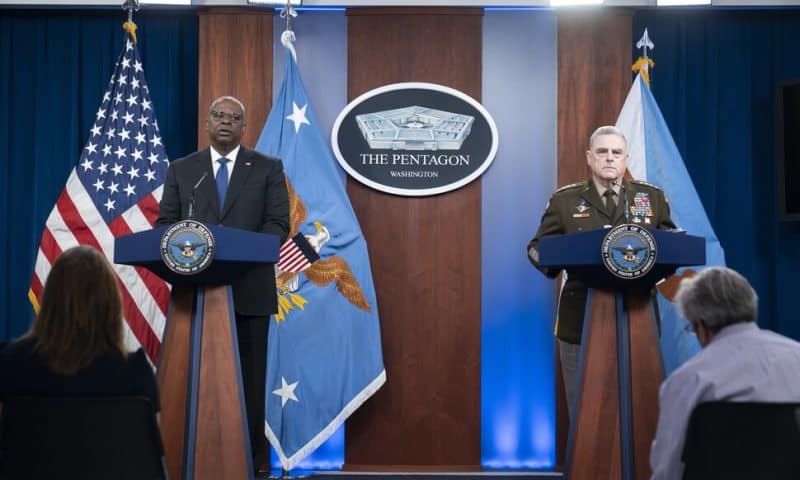Though short on specifics for how the administration would enforce the assertion, Defense Secretary Lloyd Austin issued a stern warning to Tehran after it affirmed new support for Russia.
Defense Secretary Lloyd Austin on Wednesday warned Iran against supporting Russia with its invasion of Ukraine a day after the intractable U.S. adversaries publicly expressed a desire for new forms of cooperation, including potential weapons exchanges.
“We would advise Iran not to do that,” Austin told reporters Wednesday afternoon shortly after convening a virtual meeting of the Western countries supporting Ukraine with weapons shipments and other forms of aid. “We think it’s a really, really bad idea.”
Austin did not offer any further details on what the U.S. is prepared to do to deter Iran from cooperating with Russia. When pressed later, Army Gen. Mark Milley, the chairman of the Joint Chiefs of Staff who spoke alongside the secretary, declined to offer any specifics, dismissing the question as a policy issue.
But the new partnership comes at a particularly fraught time for President Joe Biden as his administration struggles to pressure Iran to rejoin the 2015 agreement governing its nuclear program – with no significant signs of success so far.
And Russian President Vladimir Putin, visibly emboldened despite intense Western pressure since ordering the invasion, completed a trip to Tehran this week to meet with his counterpart as well as the country’s supreme leader, Ayatollah Ali Khamenei. Though ostensibly about each country’s involvement in the ongoing wars in Syria, the leaders appeared to discuss new forms of military cooperation, including potential weapons sales as Russia enters the sixth month of its war.
National security adviser Jake Sullivan told reporters on Monday that the U.S. believes Iran was prepared to deliver as many as 100 drones to Russia to gain new advantages against some of Ukraine’s sophisticated Western-supplied weapons. National Security Council spokesman John Kirby said after Putin completed his trip that the U.S. had no indication the two countries had agreed on a sale.
Russia’s ambassador to Iran unsubtly stated Wednesday morning that Iran and his country “have no problems, no restriction regarding military-technical cooperation.”
“There are no restrictions there,” Ambassador Levan Jagaryan told a local news channel.
And Putin, who cloistered himself in Moscow for the first few months of the Russian invasion, now appears much more willing to travel internationally to shore up support from his allies and partners despite intense Western sanctions and travel restrictions on Russia’s top officials. Kremlin spokesman Dmitry Peskov told reporters Wednesday morning that Putin is planning “several more visits” to foreign countries this fall.
Russia has new need for weapons. Its forces, which greatly outnumber Ukraine’s, are proving vulnerable to the advanced weapons that the forces loyal to Kyiv have been able to field – particularly as the conflict settles into a protracted artillery battle along a steady contact line rather than the chaotic repositioning on both sides that defined the first few months of hostilities. Russia has suffered from intense shortages in personnel amid high levels of battlefield casualties and has increasingly turned to criminals, children and old men to reinforce its flagging units. It has also engaged in what Western countries consider war crimes in an apparent attempt to inflict fear in its adversaries.
Ukraine has had particular success with the Western-supplied HIMARS advanced satellite-guided rocket launchers that have been able to target rear artillery systems that Russia previously considered safe from attack.
Austin announced Wednesday the U.S. would provide four more HIMARS systems, bringing the pledged number up to 16 as American troops continue to train their Ukrainian counterparts on how to use them.
Though a significant addition to the battlefield, it falls far short of the demand Ukrainian officials say they need. Defense Minister Oleksii Reznikov told the Atlantic Council on Tuesday that Ukraine needs no fewer than 50 HIMARS to effectively deter Russia along a contact line that he says is as long as the distance from Barcelona, Spain, to Warsaw, Poland. Ukraine would need 100 of the systems if it were to go on the offensive against Russia, the minister added.
Analysts have faulted the Biden administration’s support for Ukraine as too slow and too small, with too much of what several describe as a “father knows best” approach to determining what Ukraine’s post-Soviet military needs.
Austin fended off these accusations on Wednesday.
“We think what they have and what they’re working with is really giving them a lot of capability,” Austin said. Additional weapons shipments “will be based on how they’re prosecuting this fight and what their needs are.”

